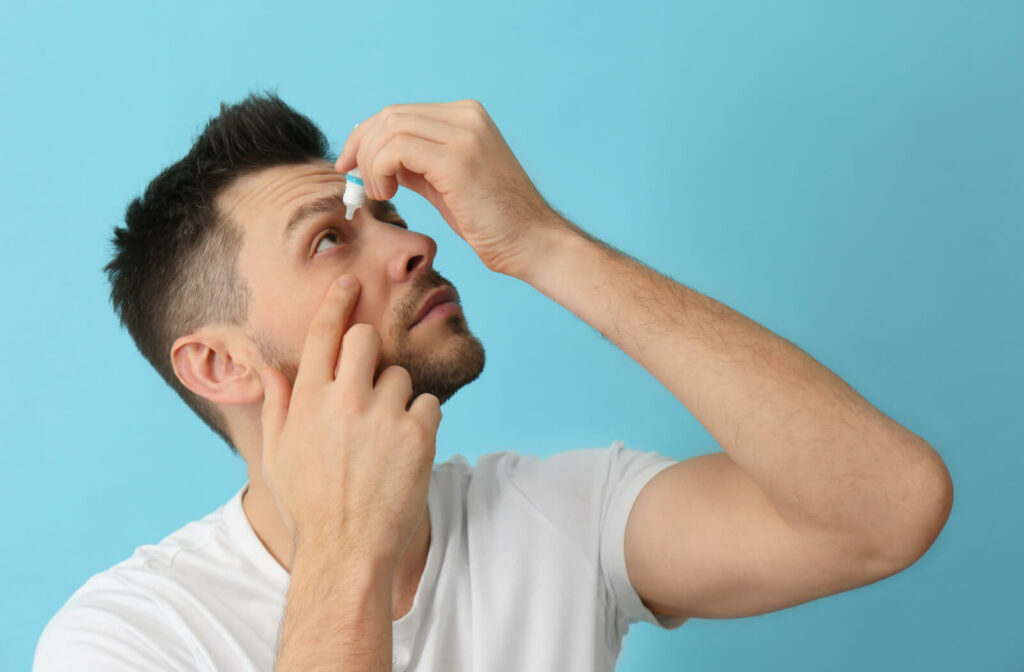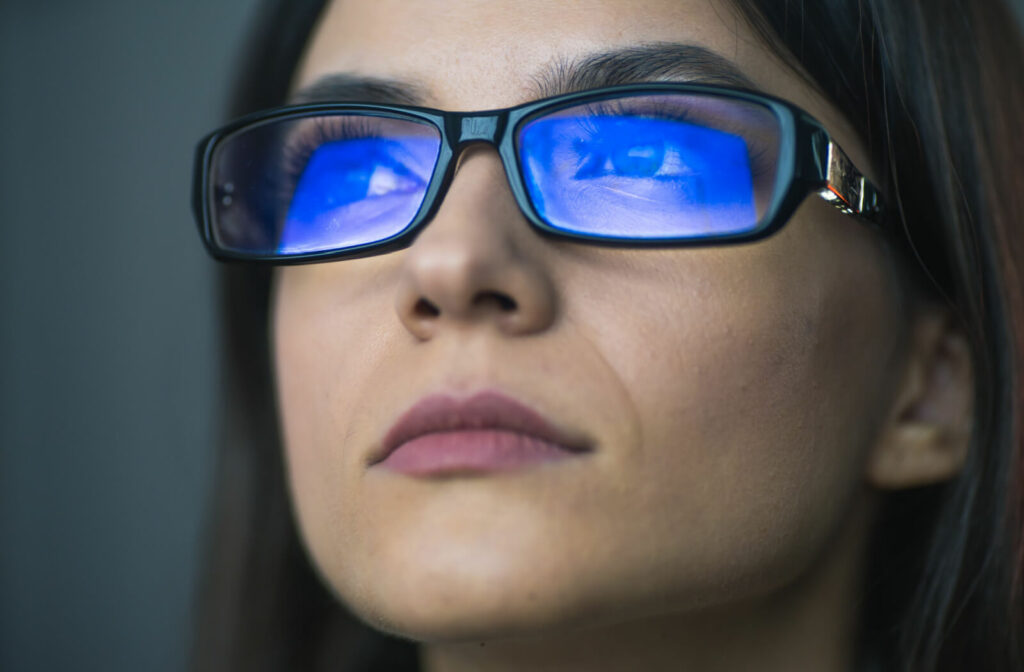In today’s digital age, many people spend a significant amount of time in front of screens, leading to many concerns about potential side effects. Too much time at a screen can lead to eye strain, blurry vision, and dry eye syndrome. Could blue light glasses help avoid this?
Blue light glasses don’t reduce dry eyes, but they do help protect your eye from long-term damage to your retina or premature aging caused by blue light. If you experience symptoms like blurred vision or discomfort, whether at the computer or in general, it’s more than likely dry eye syndrome is causing them. While blue light glasses can’t fix this condition, they may be able to help—you should consult with your optometrist to make a plan to treat your dry eyes.
What Is Dry Eye Syndrome?
Dry eye syndrome is a common condition that affects millions of Canadians every year and is best described as a burning, irritating, or gritty feeling in your eye. In some situations, it can even appear as though your eyes are too watery. Your cornea regularly communicates with your brain, so if you have dry eye syndrome, it can send a repetitive message that your eyes are too dry, causing your brain to produce too many tears.
However, dry eye syndrome is caused by an issue with your tear production, meaning our eyes don’t produce enough tears, or they don’t produce high-quality tears to keep them hydrated.
When your eye is healthy, it evenly disperses a clear film of tears across its surface every time you blink. These tears provide lubrication and hydration while protecting its surface from dust and debris. This base level of tears is made up of 3 layers:
- The mucus, or mucin, layer: This layer keeps the tear attached to your eye’s surface and ensures it has a clear, smooth surface.
- The water, or aqueous, layer: This makes up most of the tear and helps provide moisture and lubrication to the eye’s surface. This keeps the eye hydrated, nourished, and protected.
- The oil, or lipid, layer: This helps prevent the evaporation of tears by creating a barrier to maintain the stability of the tear film.
If an issue develops with one of these layers, or the eye simply doesn’t produce enough tears, it can lead to dry eye syndrome. However, this condition can also be caused by a particularly dusty, dry, or windy environment or aging or hormonal changes. With people today being more exposed to screen time and man-made lights, research is being conducted to determine whether extended screen usage and blue light could contribute to dry eyes.
What Is Blue Light?
Blue light is a high-energy, short-wavelength light primarily present in natural sunlight, digital screens, and LED lights. As more people are exposed to blue light from computers than ever before, scientists are becoming increasingly interested in its potential impact on eye health.
While it’s believed that prolonged exposure to blue light could lead to eye strain and trouble sleeping, there isn’t enough evidence to prove whether or not blue light can cause dry eye syndrome. However, the amount of blue light emitted by screens is significantly lower than natural sunlight, meaning it’s unlikely to cause dry eye syndrome more than exposure to direct sunlight could.
However, extended screen usage or exposure to bright environments can lead to digital eye strain, which can have similar symptoms to dry eye syndrome.
Do Blue Light Glasses Fix Dry Eye Syndrome?
Since it’s believed that blue light typically doesn’t lead to dry eye syndrome, blue light glasses do not directly fix the condition since they do not affect your tear production. However, they are still valuable., as they may help improve your sleep quality which is when your eyes recoup from exposure to our harsh environment.
So blue light blockers can help reduce the long-term effects of blue light on your retina, which can advance how your eyes age over time. Screen exposure can alter our natural sleep cycle. By filtering out this wavelength, blue light glasses may even help maintain eye health through better sleep.

How to Treat Dry Eye
If you have dry eye syndrome, it’s best to speak to your optometrist. Although it begins as an irritating condition, it can lead to long-term discomfort and damage if left untreated. Your optometrist can determine what’s causing your dry eyes and help build a treatment plan to help resolve the condition. Simply bring it up during your next eye exam.
At In Focus Eyecare, we offer several options for treating dry eye:
- Artificial tears. There are different types. We’ll help select the one best suited for you.
- Warm compresses
- Omega-3 supplements
- Medication. Certain medications can help increase tear production
- Intensed Pulsed Light (IPL) for inflammation control
- Radio Frequency (RF) and iLux treatments for gland obstruction
Our optometrists will assess your dry eye syndrome through a dry eye exam and give you a recommendation on how to best treat your condition. To contact us today and get the help you need for your dry eyes, schedule an appointment with us at In Focus Eyecare!





